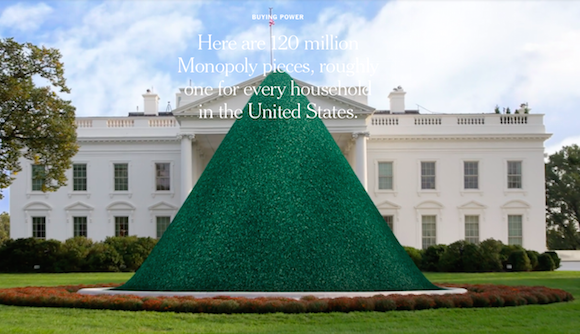Today’s New York Times featured a story titled “The Families Funding the 2016 Presidential Election.” The article reported on an investigation by Times reporters into public filings disclosing individual and superpac support for presidential candidates. This is the supposedly explosive finding:
Just 158 families have provided nearly half of the early money for efforts to capture the White House.
The Times tries to fit the data into a “big money favors Republicans” narrative:
But regardless of industry, the families investing the most in presidential politics overwhelmingly lean right, contributing tens of millions of dollars to support Republican candidates who have pledged to pare regulations; cut taxes on income, capital gains and inheritances; and shrink entitlement programs.
It’s a funny thing: papers like the Times are always telling us about the torrent of financial support for the GOP, yet in virtually every contested election, more money is spent on behalf of the Democrat. Moreover, with respect to this election cycle, the Times never considers the possibility that more money is flowing into the GOP side because its candidates are more numerous, more diverse and more appealing. The Democrats have nothing on offer but elderly, warmed-over leftists.
The Times plays to demographic stereotypes:
They are overwhelmingly white, rich, older and male, in a nation that is being remade by the young, by women, and by black and brown voters.
Which drew this rejoinder from Ann Althouse:
And, second, if we’re talking about families — 158 families — how are they “overwhelmingly… male“? Are there a lot of gay men spending this money or just heterosexual couples who somehow produce far more sons than daughters? Or is it that the NYT is operating within the old stereotype that sees a family with a man in it as headed by the man?
Ann is struck by the fact that it would take very little for those who are currently unengaged to outweigh the influence of the 158 families identified by the Times:
There are 120 million households, and 158 spend half of what is spent, an amount that’s only $176 million. If all of the households gave just $5, that would be $600 million, vastly overwhelming those supposedly fearsome, overspending, rich, white men. That money could be given directly to that candidate (since it comes, obviously, nowhere near the limit).
Instead of complaining about 158 families spending $176 million (which strikes me as a fairly paltry amount, especially since only $2,700 can be given to a candidate), the clamor should be about the need for everyone to give just a little money to someone. Skip one cup of coffee, one cheeseburger, one movie, and give the money to the candidate you like best. It could be so easy.
And yet bitching about those terrible rich people — those terrible male white people — serves other political interests…interests that the rich white males who own The New York Times have a constitutional right to push with all the powerful rhetoric and lovely graphics they can muster.
Ann hints at the truth, which is that the people who run the Times don’t like competition from people of means who are not on the left-wing bandwagon:
[W]e’re talking about spending money on speech, that’s what Citizens United “legalized.” I’m putting “legalized,” in quotes, because what the Supreme Court did in Citizens United was to perceive the existence of a constitutional right, a right to spend money on speech. These are not contributions to the presidential campaigns, but companies [in Citizens United and families and their companies in the NYT study] spending their own money to get their opinions out into the marketplace of ideas, just as The New York Times corporation spends its money to get its ideas out, including its idea that there’s something spurious about corporations engaging in political speech.
The rich people who own the New York Times, and the reporters and editors who work for them, are very clear about their own First Amendment right to devote corporate assets to weighing in on the issues of the day, but they are eager to deprive everyone else of the same right, especially those who don’t agree with their far-left perspective.
Steve Sailer puts it a bit more crudely:
As you may have noticed, the New York Times strongly objects to American citizens financing political campaigns. (If the rich are to have influence over the American political process, the respectable way is for a Mexican monopolist who has made billions off encouraging and exploiting illegal immigrants to hand a few hundred million dollars over to the New York Times.)
I have only one further observation: the Times thinks it is scandalous that 158 families have, so far, contributed close to one half of the money expended on behalf of presidential candidates (assuming that is, in fact, the case). But that money is nowhere near as important or as effective as the news coverage that voters absorb day after day. What percentage of the total newspaper circulation belongs to the top 158 newspapers, a group that includes the Times? I can’t readily find the numbers, but it must be well over half. And of those 158 newspapers with the largest circulation, how many are pro-Democrat? More than 150, no doubt.
What the New York Times really objects to is diversity. The only way to get free speech nowadays–diverse free speech, anyway–is to pay for it. Thank God there are a handful of people with the means and the will to do so.

Notice: All comments are subject to moderation. Our comments are intended to be a forum for civil discourse bearing on the subject under discussion. Commenters who stray beyond the bounds of civility or employ what we deem gratuitous vulgarity in a comment — including, but not limited to, “s***,” “f***,” “a*******,” or one of their many variants — will be banned without further notice in the sole discretion of the site moderator.